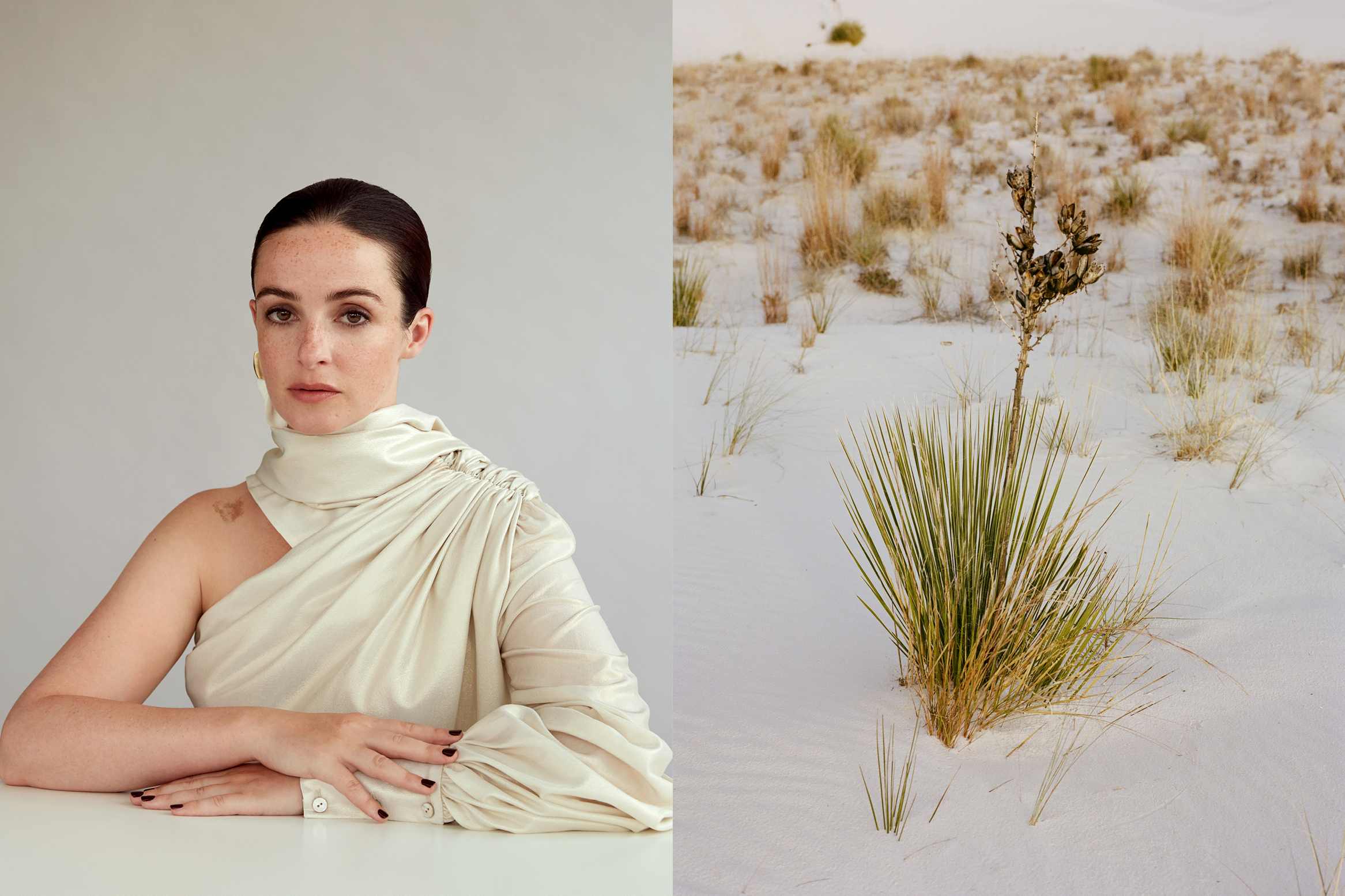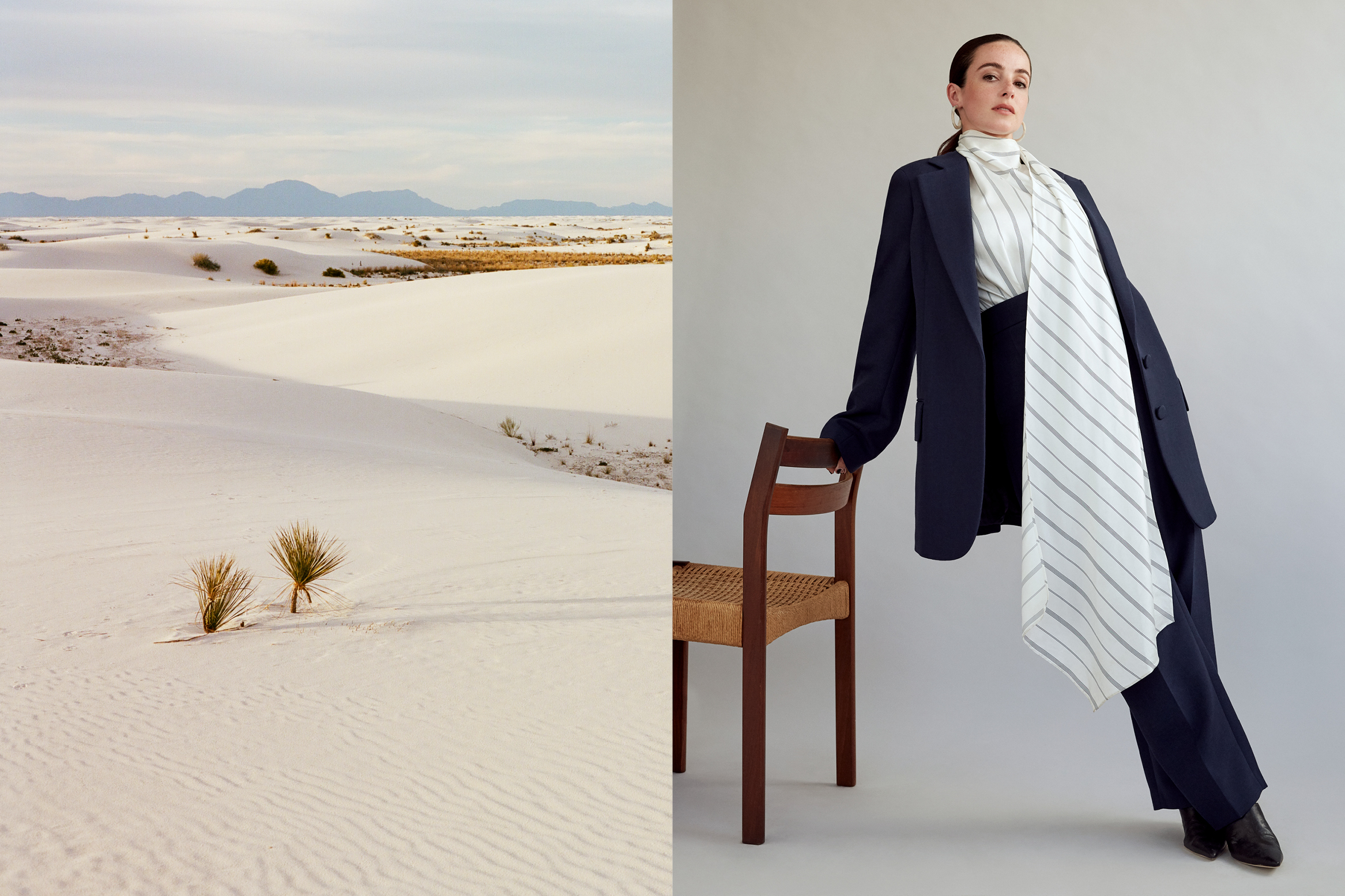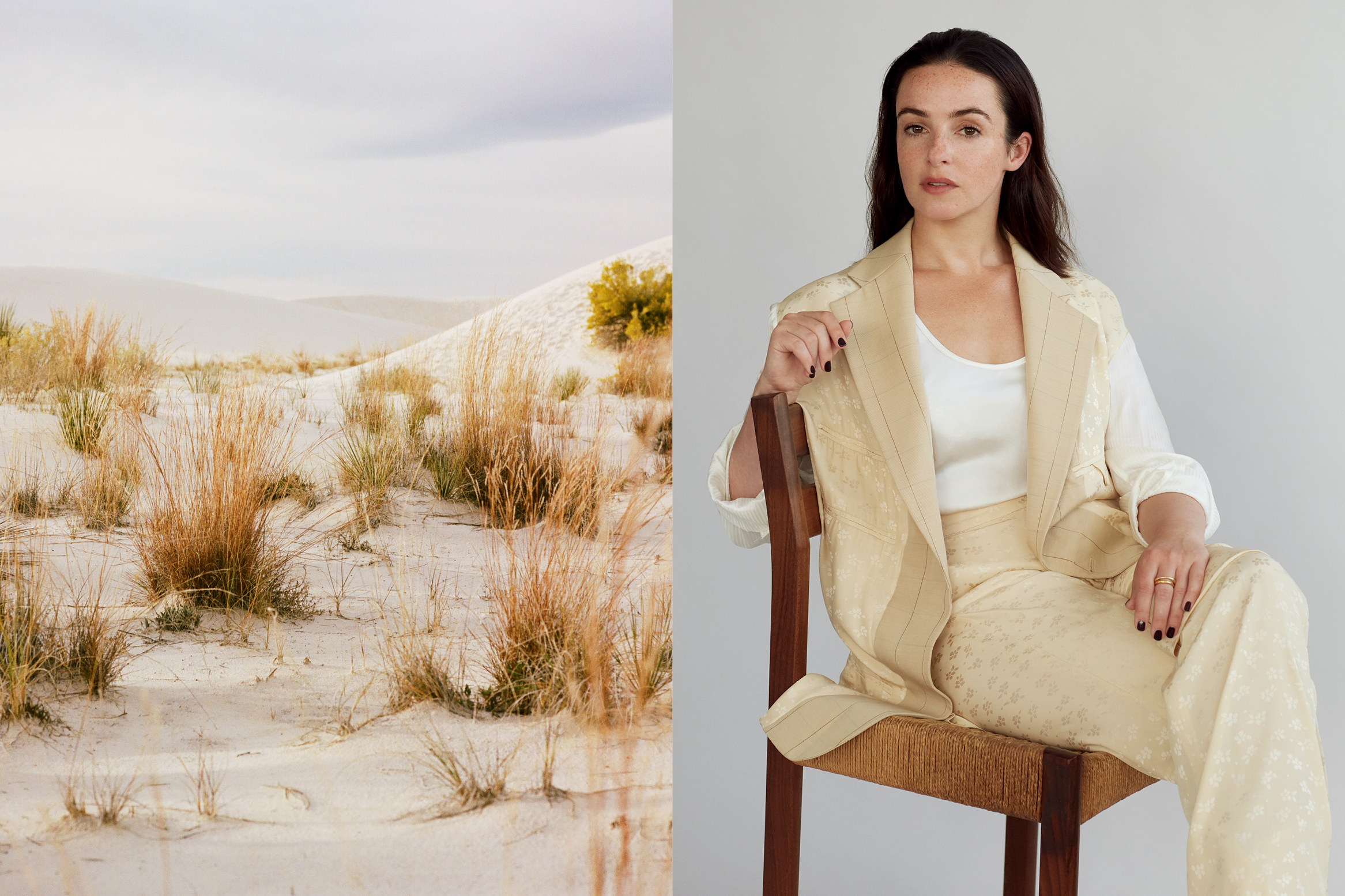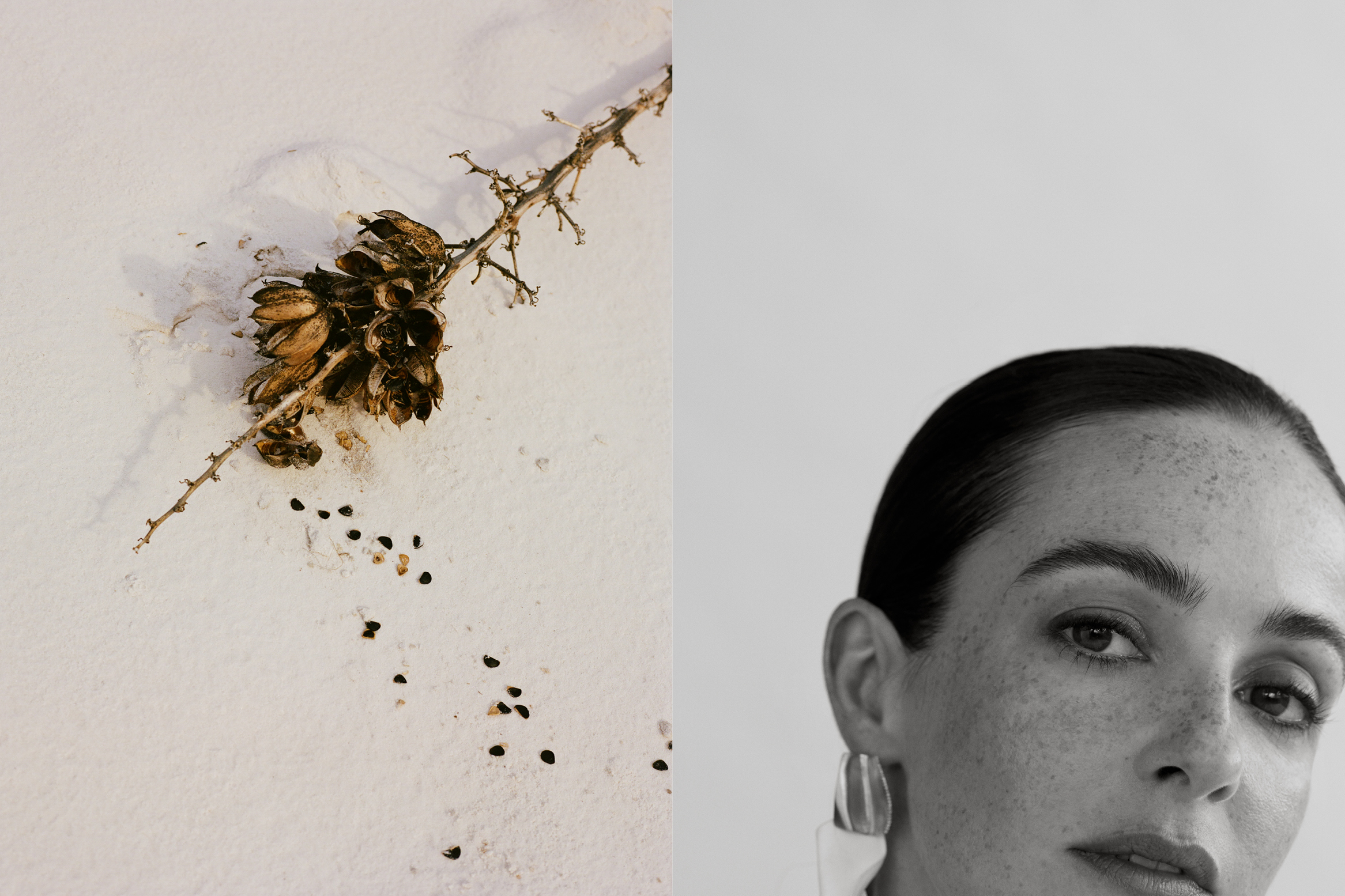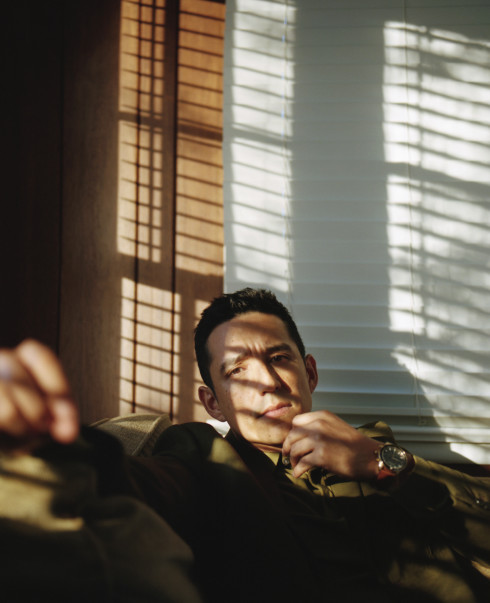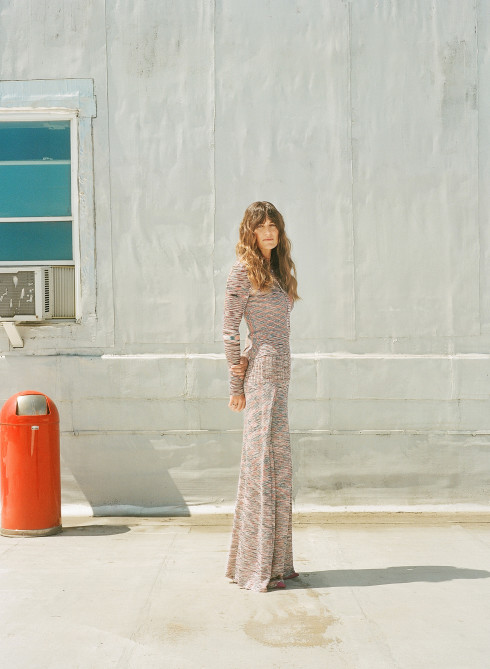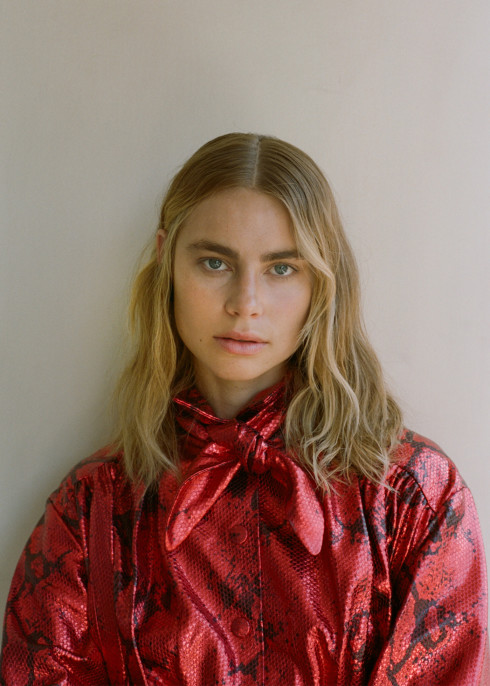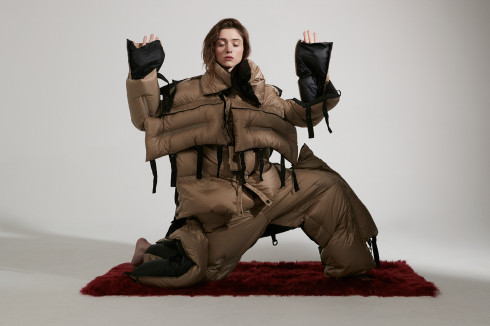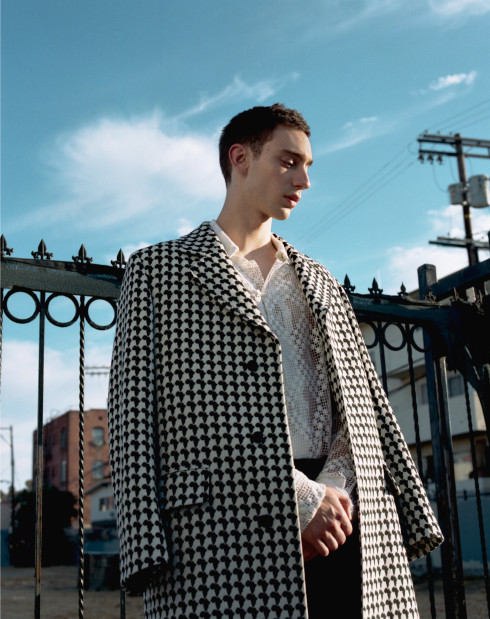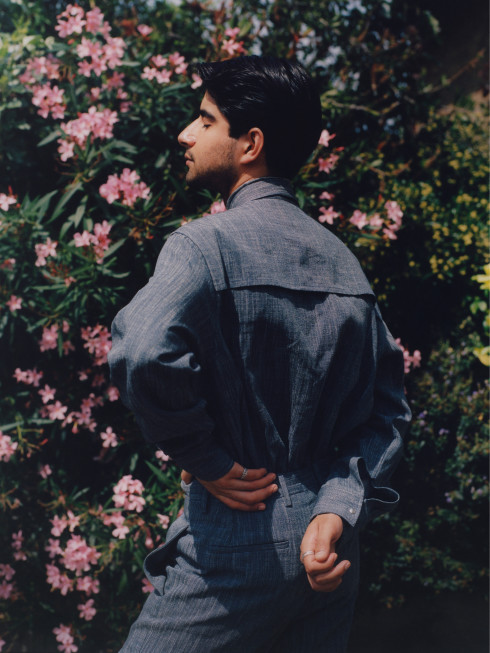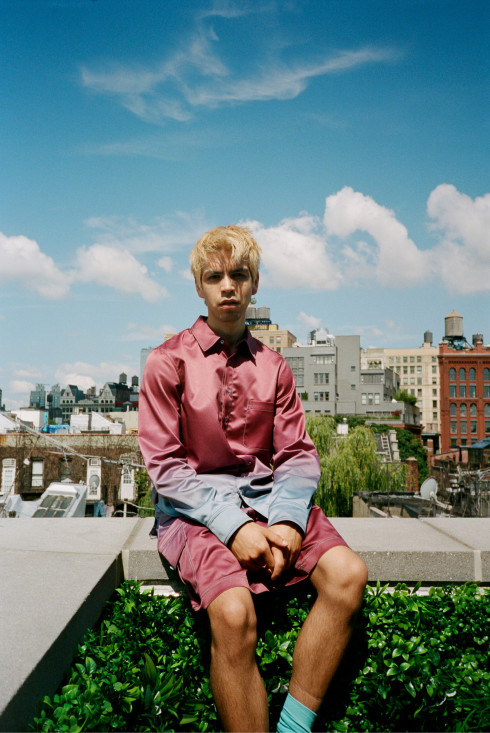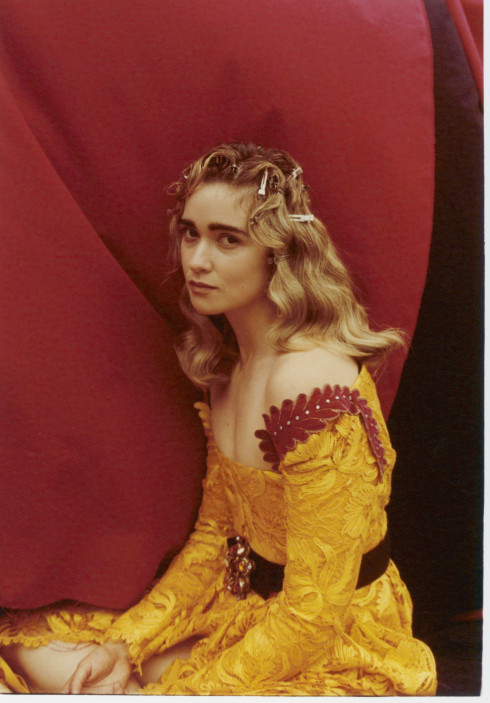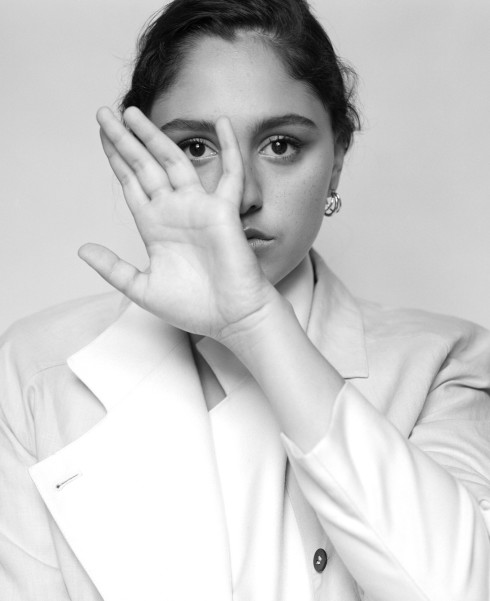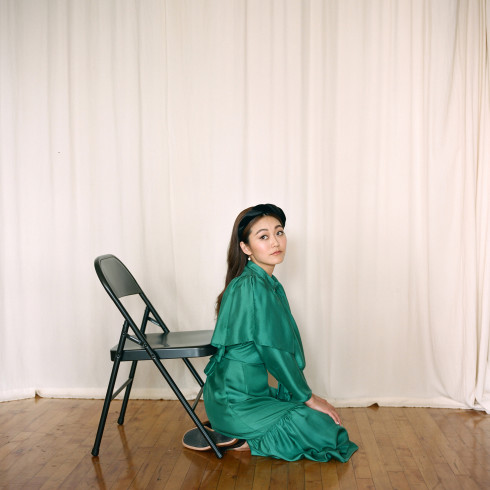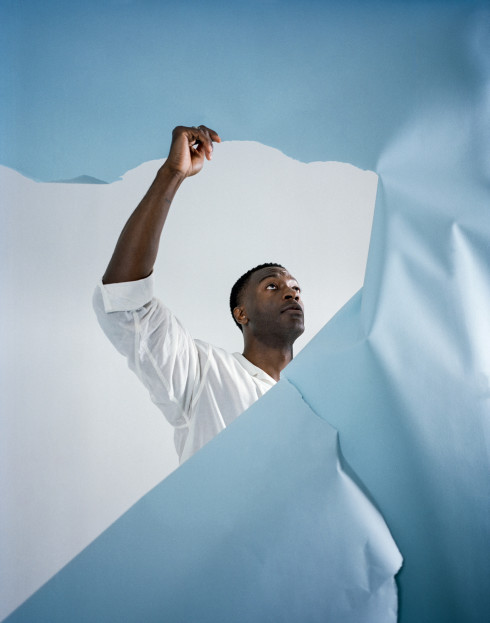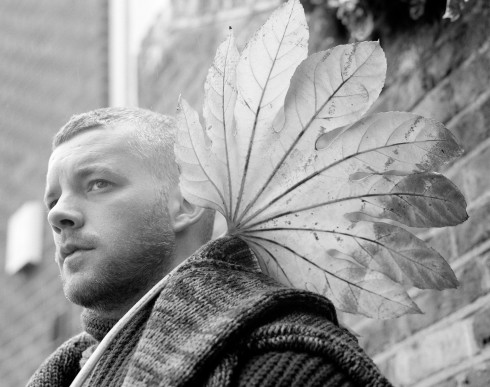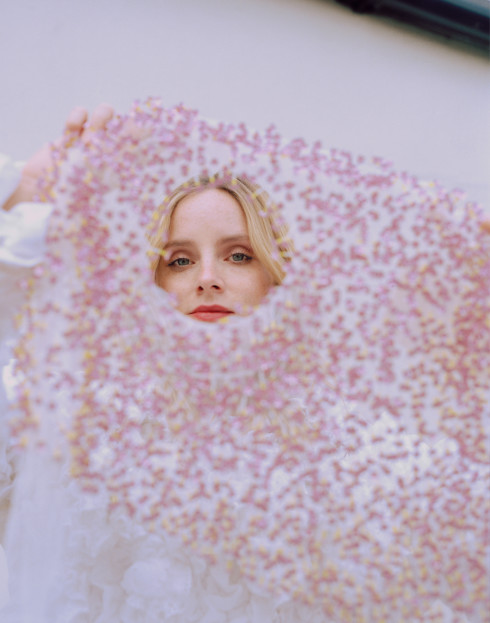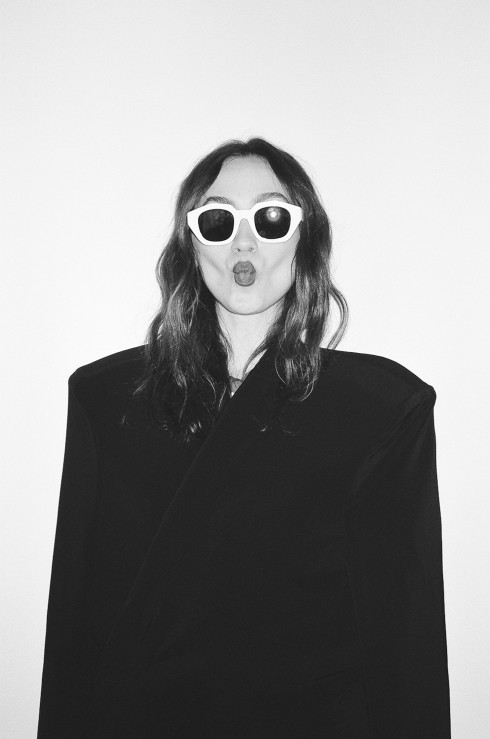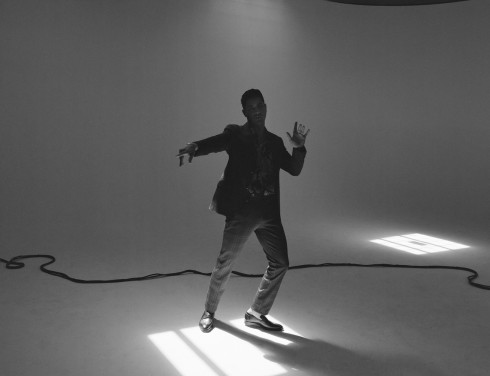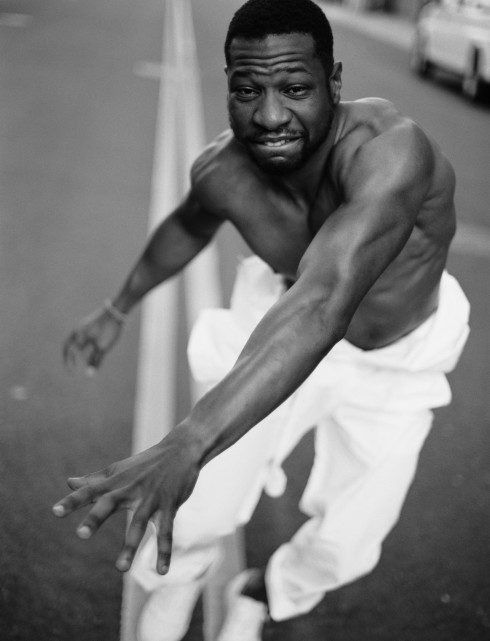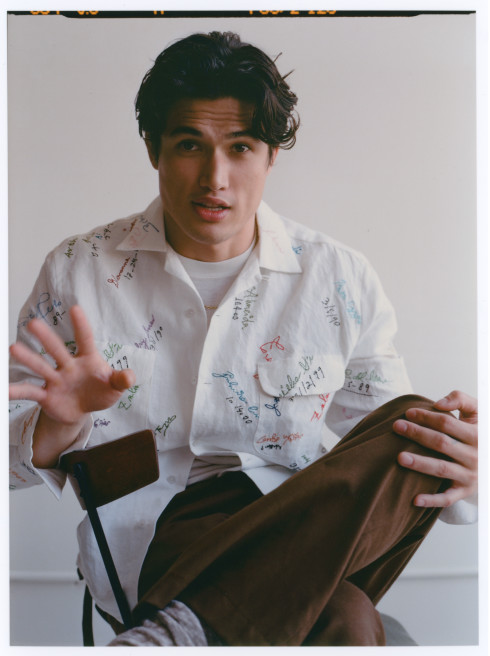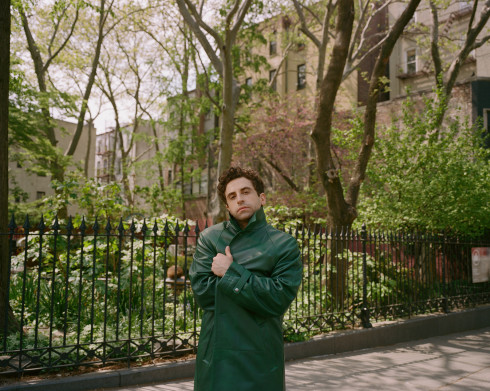
Dress by Victoria Beckham. Shoes by Neous. Earrings by Anissa Kermiche. Rings by Dinny Hall.
- By
- Jonathan Shia
- Photography by
- Georgia Devey Smith
- Styling by
- Julia Brenard
Hair by Anna Chapman at Julian Watson Agency. Makeup by Isobel Kennedy. Photographer’s assistant: Chris Greenaway. Stylist’s assistant: Caterina Ospina.
LAURA DONNELLY DELVES INTO HER OWN FAMILY HISTORY IN 'THE FERRYMAN'
A celebratory family meal for nearly twenty marks the centerpiece of the new Broadway play The Ferryman, but those in the mood for a simple and pleasant holiday tale would do best to look elsewhere. Jez Butterworth’s latest work, which won the Olivier Award for Best Play earlier this year for its previous West End incarnation, is thrillingly and emotionally wrenching, encompassing political tragedy and family drama as it traces the tumultuous course of a single day for the Carney family in rural Northern Ireland during the Troubles, when much of the population was in open violent rebellion against English rule. With the harvest waiting to be brought in, the Carneys and their kin the Corcorans have gathered against the backdrop of a hunger strike by Irish political prisoners, with Margaret Thatcher ranting over the radio and the teenage boys boasting about their connections to the IRA.
At the center of all this swirling tumult is Laura Donnelly’s Caitlin Carney, who learns at the start of the play that her husband Seamus, who disappeared years ago, has been found in a bog. Stoic and surprisingly composed, Caitlin nonetheless manages to prepare the harvest feast in the house of her brother-in-law Quinn, who took in her and her son Oisin when Seamus went missing. Quinn’s wife Mary, the mother of seven, has cloistered herself in her bedroom and the palpable chemistry between Caitlin and Quinn is one of the play’s many tightly interwoven threads.
For Donnelly, who also won Best Actress at this year’s Oliviers, the story of the Carneys is intensely personal. Her uncle, Eugene Simons, was “disappeared” in 1981 much like Seamus, with his widow left wondering about his fate. Especially cruelly, acquaintances would report from time to time that they had spotted Simons, purposely dragging out the family’s suffering without closure. Butterworth, who is Donnelly’s partner and the father of her two children, was inspired to write The Ferryman after watching a documentary about the disappeared with her soon after they met while she was performing in his play The River opposite Hugh Jackman. “Over about six bottles of red wine and a big bowl of pasta, the entire thing got plotted,” recalls Donnelly about their initial wintry brainstorming session in upstate New York. “He says that that’s very unusual—he never sits down and plots it out like that. It was just this strange thing where we woke up the next day and it was snowing and we had a feeling in the air that something special had just happened.”
The process of exploring The Ferryman and her role as Caitlin gave Donnelly, thirty-five, cause to delve into corners of her own family’s history she had never approached. “I knew that my uncle had been murdered by the IRA and I knew that his body hadn’t been recovered for several years,” she explains, “but I didn’t understand that this was a story that was very specific to a small number of people and a small number of families in Ireland.” She turned to her mother especially for answers, wary about the responsibility of asking her family to revisit painful memories. “It’s kind of the nature of the Troubles in general in Northern Ireland, but very much the nature of the story of the disappeared,” Donnelly says, “because it’s the silence that allows that to continue and allows for the shame and the guilt and the lack of grieving possible that we look at in the play.”
Perhaps somewhat surprisingly for a work that focuses on the cruelty of the English, The Ferryman was a record-breaking, sold-out hit during its London run. For Donnelly, the different historical contexts have both sharpened and broadened the play on its transfer to New York. “I think that the audience here sees the play differently in terms of its politics,” she suggests. “In the UK, it’s closer to home and to a degree, an English audience can feel implicated by this play a little, which may result in slight defensiveness in watching it, which is understandable.” In the United States, the family drama has moved to the fore. “Primarily, it’s a family story and it’s a love story and therefore you don’t need to know anything about the politics,” she continues, “because the fundamental truths of the play are human and universal. I think that when emotion is real and raw on a stage, you can understand it never mind having any prior knowledge. Even as far as language is concerned, I think that you can watch a play in a different language and still understand its heart.” The quality of listening in New York, she adds, seems better: “I always feel very much like we’re getting every response that we love to be getting.”
It’s no surprise that Donnelly feels a certain sense of ownership over Caitlin, the role it seems her entire life so far has been leading her towards. Her first experience on stage came as a child as a student of Patricia Mulholland, who pioneered a form of what she called “Irish ballet,” or dance that pulled from Irish myths and history with significantly more grace than the stereotypical jig. “Being in the theater was so magical; my favorite place to be was backstage,” Donnelly recalls. “I would get pulled out of school early on performance days and I would know that I was missing this stuff that I didn’t care about at all—maths and whatever else—to get to go and put on a costume and go tell a story. I think from that moment I had decided that that was what I wanted to do. [Mulholland] had said to my mother, ‘She’ll be on the stage,’ so I don’t know if I’m on it because she said I would be or if she actually saw something that I would have done anyway, but that was definitely what led me onto it. Then through growing up and maturing and realizing what acting truly was about, I started getting different things from it that I just felt I needed.”
She points to her first professional Shakespeare role as Juliet at the Regent’s Park Open Air Theatre as an especially formative early experience. “When you’re speaking Shakespeare’s words and Juliet is speaking to the moon or the gods of the sky, that’s all there,” she recalls. “There was something so magical about that that I realized that theater was the thing that I thought I would get the most satisfaction out of.” She credits Declan Donnellan’s The Actor and the Target, which describes his revolutionary theories on acting, for being similarly important to her. “It changed my entire way of acting and in fact, it gave me a focus and an understanding about it that I genuinely hadn’t had before,” she says candidly. “I think at that point I started actually just becoming a much better actress.”
Donnelly continues to prefer the stage—“It’s just not that often that I read a TV script or a film script and think, ‘Wow, I have to play this character,’” she admits. “That happens a lot in theater”—but her most passionate fanbase so far is thanks to the Starz series Outlander, the time-traveling romance in which she played Jenny Fraser, sister-in-law to Caitriona Balfe’s Claire. Having agreed to the show partly for the opportunity to work in Scotland, where she had previously studied at the Royal Scottish Academy of Music and Drama, Donnelly confesses to not having known how popular the books were before signing on and says she is still pleasantly surprised by the phenomenon it has become. “I don’t tend to look into these things before I do them,” she says. “I don’t go and Google like, is this worthwhile doing from a fan standpoint? You just do the job because you think it might be a fun thing and then suddenly it took off.”
With The Ferryman now open to soaring reviews, Donnelly says she is looking forward to getting reacquainted with her favorite bars and restaurants she discovered when she was last in New York for her Broadway début in The River in 2014. “It’s really easy when you’re young and single in New York and doing theater to finish and be up all night and sleep through your days,” she laughs. “I guess I’ll get a bit more daylight this time.” With two young daughters now in tow, she is especially excited about the upcoming holidays: “I think it’s the best time of year to be in New York.” Thanks to a recent extension of The Ferryman’s run into July, she’ll have the opportunity to stay on through spring and summer as well.
Two years on from the first table read of The Ferryman, Donnelly says it’s a testament to the strength of Butterworth’s writing and her personal stake in this story that she manages to feel inspired night after night in her grueling role, in which, “out of three hours and twenty minutes, I do about two-and-a-half hours of crying,” she jokes. “As an actor, you don’t normally get that level of agency over your life,” she says, “and to feel like you’ve created something or at least helped create something and for it to have come off is amazing.”
The Ferryman is now running at the Bernard B. Jacobs Theatre, New York.
- By
- Jonathan Shia
- Photography by
- Georgia Devey Smith
- Styling by
- Julia Brenard
Hair by Anna Chapman at Julian Watson Agency. Makeup by Isobel Kennedy. Photographer’s assistant: Chris Greenaway. Stylist’s assistant: Caterina Ospina.
